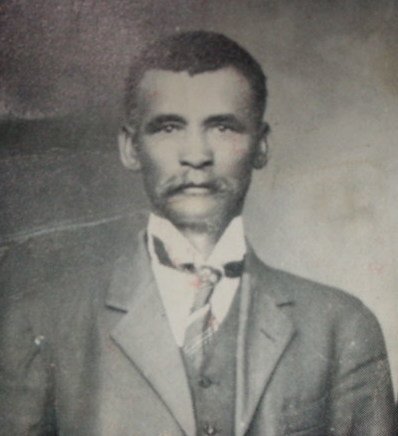The Remarkable Life of Rev. Joseph Sidney Prentice
This untold story focuses on the preacher and early champion of education for African Americans for whom Montevallo's "Negro" high school was named in 1954. Prentice High School stood at the site of what became Montevallo Middle School in 1970, marking the end of segregated schools in the City of Montevallo.
Joseph Sidney Prentice
Born into slavery in 1857 in Aldrich, Joseph Sidney Prentice belonged to the first generation of freedmen. During his long and remarkable life -- he lived to be 86 — he was a miner, farmer, merchant, husband, and father of eleven, property owner, registered voter, Mason, pastor of a host of Baptist churches In at least three counties, and leading figure in the Bibb County District Association for over four decades:
Prentice bravely navigated an uncommon life for a man of color during the Jim Crow era and his story should be known. We will begin by highlighting some things we have learned about his contributions to the local area as a religious leader.
First, is a quick summary of his leadership role within the local and state Black Baptist Associations. From 1903 until his death in 1944, he was Moderator of the Bibb County Baptist Association. He was also President of the Sunday School
District Convention, Member of the State Mission Board, Member of the Publishing Board, and pastor of numerous churches in Bibb, Shelby, and Chilton counties for nearly half a century. Among them was Ebenezer in Ashby, Rising Star in West Blocton, New Convert in Maplesville, St. Mark in Calera, Hopewell in Clanton, Epsibeth in Aldrich, and his home church, New Hope, in Randolph.
According to the 1870 Census, Joseph, aged 12, was a farm laborer who could not read or write. The 1880 Census records that he was an illiterate miner. At some point, clearly, he acquired literacy skills. By around thirty he began preaching, probably in Randolph, in Bibb County, where he had family ties. By 1891, he was pastor of record at New Hope Baptist Church in Randolph. The first New Hope ChÜrch building is believed to have burned down. The second New Hope Church building was erected on June 1 5, 1908 under Prentice's guidance. (New Hope Church history courtesy of Larrhea Sims.)
Randolph boasted four Black Baptist churches with more than 340 members altogether. New Hope had the largest congregation, with a reported membership of 184 the year Prentice was installed as pastor. By 1894, it had nearly 200 members. In 1893 Prentice was paid an annual salary of $150 making him the best-paid pastor in the Association.
His powers as a dynamic speaker were soon recognized outside Randolph. "Rev. Prentice certainly is at home when placed in the sacred desk," wrote an attendee of the annual Association meeting in 1892; "his audience [was held] spell-bound." The following year, he preached a "masterly" sermon that "added greatly" to his reputation as a compelling speaker." "Too much cannot be said of Rev Prentice as a preacher." (Bibb co. Assn. Minutes, 1892, 1893, 1894.)
Prentice was also an acclaimed church singer. He was especially associated with an AME song entitled "No Compromise" that simultaneously declares defiance of sin and white supremacy. One of its verses proclaims, "Look, a mighty host advances / Now, see the proud oppressors flee; / See, our country breaks its fetters, / And sets her captives free." It ends: "Thine oppressors bend to thee." (Shelby Springs Assn. Minutes, 1899.)
He played important roles in two Montevallo churches. The annual statistics compiled by the Shelby Springs Baptist Association show that in 1894 and 1895 when Shiloh
Missionary Baptist Church had only 12 to 13 members, Prentice was pastor of record. He was evidently helping the fledgling group 42 ang et started. In 1899, the membership had grown to Shiloh was officially established and pastored by Rev. Isaac Witherspoon. In 1908, Prentice was installed as pastor of Epsibeth Baptist Church in his home town of Aldrich. According to current pastor, Rev. Lorenzo Mitchell, the original name of the church was Hepzibah, but the spelling went through multiple variations before settling into "Epsibeth."
Recent accounts of Prentice stress his advocacy of education, and rightly so. Like others in the first-freed generation, he believed fervently in the power of education to uplift "the race"; as a Baptist leader, he promoted the urgency of learning at every opportunity. A statement that he signed in 1893 speaks volumes: "Let us do all in our power to educate ourselves and our children"; by this shall be able to compete with any race of men intellectually, morally and religiously" (Bibb Co. Assn Minutes.)
Toward the end of Prentice's life, as he approached eighty, the Shelby County Reporter published a tribute to the•man known to his friends as "Uncle Joe." It summarized the very remarkable record of his "service to his people" (Ap 15, 1937). Rev. Prentice, life-long resident of Aldrich, earned the respect of Montevallo's leading white citizenry and the love of the Black community he served, tirelessly, for five decades. It is time to consider restoring his name to the Middle School that stands at the site of the former Prentice High School.




